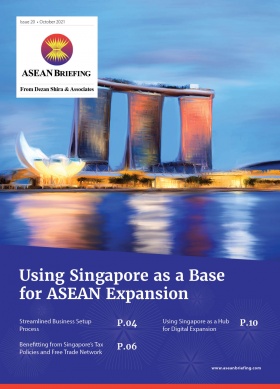What are the Rules for Implementing Value-Added Tax on Foreign E-commerce Activities in Cambodia?
Cambodia’s Prakas 542 provides the rules for implementing a value-added tax on non-resident foreign e-commerce suppliers. Prakas 542 also clarifies that the non-resident entity must register for VAT purposes in Cambodia and file for VAT returns if their turnover from the e-commerce activities reaches a certain threshold.
Notified in September 2021, Prakas 542 provides the rules for implementing value-added tax (VAT) on foreign e-commerce activities in Cambodia.
Prakas 542 is an implementing regulation of Sub-decree 65, which was issued in April 2021. It mandates that non-resident e-commerce entities register for VAT with the local tax authority – if they do not have a permanent establishment in Cambodia. (E-commerce entities here refer to entities engaged in the digital supply of goods and services.)
Sub-decree 65 was issued in response to the growth of Cambodia’s e-commerce sector, which bolstered by the pandemic, saw revenue reach over US$900 million in 2021 and could reach US$1.7 billion by 2025.
Cambodia’s national e-commerce strategy
Further, in November 2020, the government established a national e-commerce strategy aimed at developing the domestic industry and preparing for a robust digital economy that can integrate Cambodia’s small and medium-sized enterprises (SMEs) into global value chains.
Cambodia’s national e-commerce strategy comprises 10 chapters:
- Legal and regulatory frameworks;
- Institutional coordination and policy focus;
- Information and communications technology infrastructure;
- Payment systems;
- SME regulations;
- Cross-border trade;
- Domestic e-commerce logistics;
- Access to finance;
- Market support; and
- Digital knowledge/skills infrastructure.
What are the compliance obligations for a non-resident e-commerce provider in Cambodia?
A non-resident e-commerce supplier in Cambodia must register for VAT within 30 days. This is applicable for business-to-consumer (B2C) and business-to-business (B2B) transactions.
They must fulfill either one of the following criteria:
- Have an annual turnover of 250 million riel (US$61,400) or more of transactions with Cambodian consumers; or
- Have an expected turnover of 60 million riel (US$14,700) or more for three consecutive months in the current year of transactions with Cambodian consumers.
The fee to register for VAT is 400,000 riel (US$98) and should there be any updates or changes to the information provided – the applicant will need to pay an extra 200,000 riel (US$49).
What are the obligations for digital B2C and B2B businesses in Cambodia?
Non-resident taxpayers that supply digital goods and services under the B2C model must file VAT returns on a monthly basis and pay the tax in riel by the 20th day of the following month. The VAT rate is 10 percent.
Under the B2B scenario, non-resident taxpayers that supply digital goods and services must also file VAT returns on a monthly basis but are not required to pay the tax to the authorities. However, resident taxpayers that purchase digital goods and services from non-resident taxpayers must collect the output VAT on the ‘reverse charge mechanism’. This is done by paying the tax to the authorities by the 20th of the following month.
Exemption from VAT
Small taxpayers, as classified under Prakas 9, that purchase digital goods and services from non-resident entities are exempt from applying the VAT reverse charge mechanism for five years.
Prakas 9 was issued in January 2021 and provides a new reclassification of Cambodian taxpayers under the self-assessment regime. The regime determines taxpayers as ‘small, medium, and large’. Taxpayers are assessed on their annual turnover or on the value of their assets. Cambodia’s industrial, service, agricultural, and commerce sectors are the primary target of Prakas 9, considering they are the core sectors of the country’s economy.
Small taxpayers in the agriculture, commercial, or service sectors are those that have annual revenue of 250 million riel (US$61,400) to 1 billion riel (US$245,000).
Meanwhile, businesses in the industrial sector with annual revenue of 250 million riel (US$61,400) to 1.6 billion riel (US$393,000) are also classified as small taxpayers.
Taxpayer Classification Based on Annual Turnover
|
Taxpayer classification |
Criteria |
|
|
Prakas 025 |
Prakas 009 |
|
|
Small |
|
|
|
Medium |
|
|
|
Large |
|
|
Taxpayer Classification Based on Annual Value of Assets
|
Taxpayer classification |
Value of assets |
|
Small |
|
|
Medium |
|
|
Large |
|
What are the requirements for VAT invoicing?
When issuing a VAT invoice, the non-resident e-commerce supplier must include the following information:
- Description of the digital goods or service;
- Name, address, and/or the VAT identification number of the consumer;
- Name, address, and/or the VAT identification number of the non-resident taxpayer;
- Invoice number; and
- Taxable VAT amount.
Penalties for non-compliance
Non-resident e-commerce suppliers that fail to register with the Cambodian tax authority shall be subject to penalties according to the prevailing laws, which include fines and imprisonment.
Further Reading
- Cambodia to Establish Sihanoukville Multi-Purpose SEZ
- E-Commerce License and Permit Fees in Cambodia
- Taxpayer Classification in Cambodia: New Criteria from January 2021
About Us
ASEAN Briefing is produced by Dezan Shira & Associates. The firm assists foreign investors throughout Asia and maintains offices throughout ASEAN, including in Singapore, Hanoi, Ho Chi Minh City, and Da Nang in Vietnam, Munich, and Esen in Germany, Boston, and Salt Lake City in the United States, Milan, Conegliano, and Udine in Italy, in addition to Jakarta, and Batam in Indonesia. We also have partner firms in Malaysia, Bangladesh, the Philippines, and Thailand as well as our practices in China and India. Please contact us at asia@dezshira.com or visit our website at www.dezshira.com.








